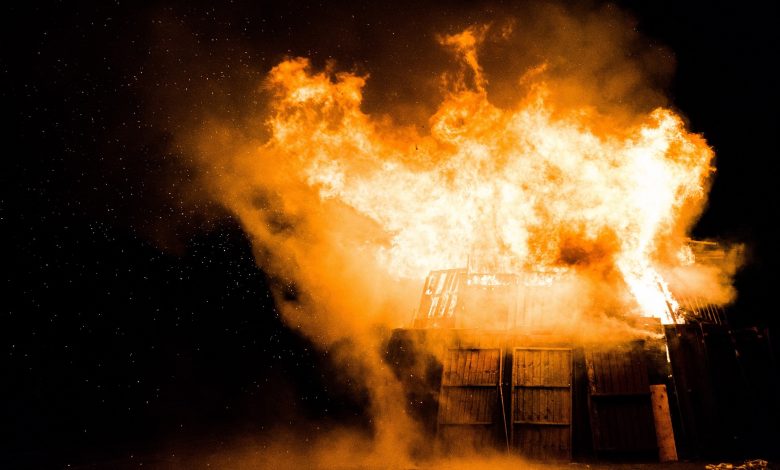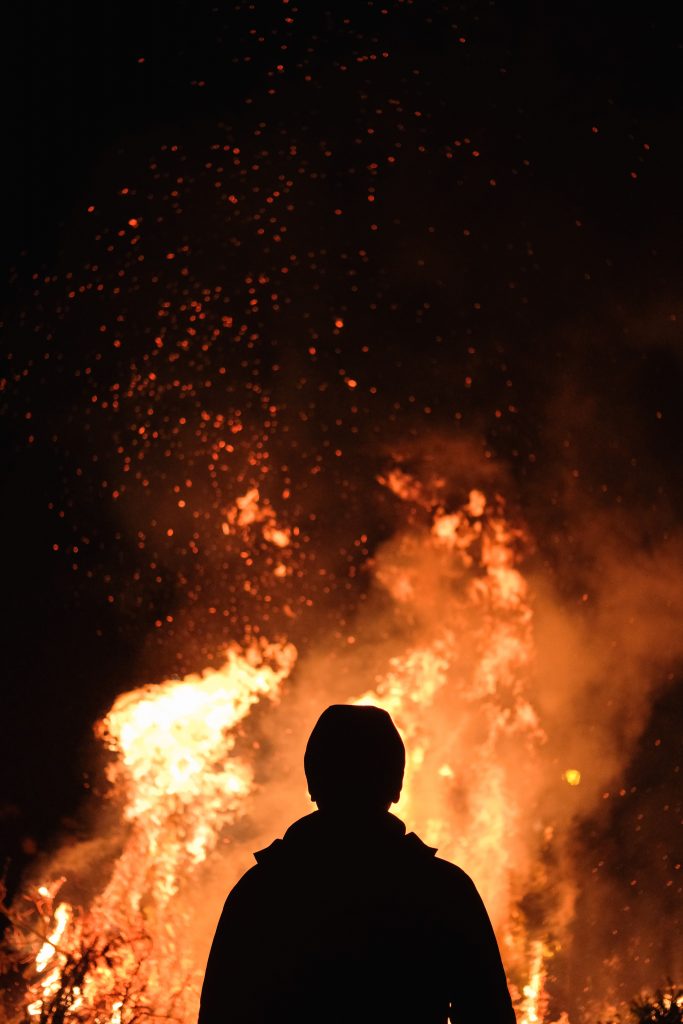When is Arson a Felony?

Arson, while a form of property crime, is taken incredibly seriously, as it can be incredibly dangerous. It can range from setting something small and of low value on fire, to setting someone’s home ablaze while they’re inside. Punishments will vary greatly with this, obviously, and cases when there are people inside the building being burned can see extreme consequences; however, this is a crime that often results in a felony conviction. There are a few aspects that must be proven in order to convict someone of arson, as well as some defenses to prove their innocence. Arson laws can vary greatly by state, and arson on government property is a severe federal offense. The reasons arson may be committed may differ, but it comes with high risk of public safety, and the law treats it accordingly.
What is Arson?
Arson is generally defined as the burning of someone else’s property with the intent to do so, also including charring and the use of explosives. Although it began as just protecting the arson of someone else’s dwelling, there are now quite a few pieces of property that are often the object of this crime, such as:
- Houses
- Buildings
- Cars
- Boats
- Machinery
- Land
- Forest
- Crops
When investigating arson, there are some pieces of evidence that generally suggest the fire was set intentionally. If it seems suspicious enough to warrant an investigation, both the fire department and police department will begin looking into the circumstances surrounding the burning. The first step when looking into the cause of a fire involves finding the initial burn site in order to determine what caused the fire. If it seems as if a fire couldn’t have naturally started where it was, or if there are multiple, unlikely burn sites, this is reason to raise eyebrows. They will also look for types of accelerants, such as gasoline, as this obviously indicates that a fire was intended to not only be started, but also spread quickly and cause damage. Checking for signs that equipment or other components of the source of the fire have been intentionally damaged or altered in some way to start a fire is also essential. Finally, they will also look for signs of forced entry if there is a claim that arsonists broke in to start a fire.
Motives for Arson
There are more reasons to commit arson than just wanting to maliciously hurt someone or their property. For one, some offenders will commit arson in order to destroy evidence. This may include destroying business records to hide wrongdoings, a murder weapon or other crime scene evidence, a stolen vehicle, or any other item that could be used to convict someone of a crime or of doing something wrong.
Additionally, some people, typically referred to as pyromaniacs, just enjoy setting items on fire, usually because of some psychological disorder, to get attention, or just for the thrill. These felons often target dumpsters, vacant houses, and even occupied buildings.
More malicious reasons may include wanting to just cause destruction, such as setting schools and other important pieces of property on fire, broadly called vandalism. It could also be a form of revenge, whether to harm someone or just destroy their belongings.
Some will start fires on their own property in order to claim insurance money, or in order to gain some kind of profit off of the fire. Most of the time these will be their business, home, boat, car, or something else important that they have an insurance policy on. This profit can also come in the form of, surprisingly, firefighters committing arson to provide themselves work or to be deemed a hero.
It can also be for extremist reasons, such as hate crimes, religious reasons, or political demonstrations. Terrorism can be carried out as arson, and other extreme cases include targeting abortion clinics or organizations they disagree with.

Federal Arson Laws
Federally, arson is governed by 18 U.S.C. § 844(i). It punishes “Whoever maliciously damages or destroys, or attempts to damage or destroy, by means of fire or an explosive,” particularly property that is used in or affects interstate or foreign commerce, as well as anyone who attempts or conspires to commit this crime. While it doesn’t include privately owned, owner-occupied property, some of the types of property this does cover include:
- Buildings
- Boats
- Machinery
- Building materials
- Military stores
- Munitions of war
- Structural aids for navigation or shipping
- Government owned land
Generally, the Bureau of Alcohol, Tobacco, Firearms, and Explosives is the federal agency that is most involved in the investigation of these crimes.
State Arson Laws
State arson laws are going to vary greatly, but these are the laws that cover most other property, such as dwellings, privately owned land, vehicles, and other more personal properties. Here’s a sample of several state arson laws:
Texas Arson Laws
Governed by Texas Penal Code § 28.01, Texas views arson as when someone sets one of the following properties on fire:
- Habitation: A structure or vehicle that is designed for people to stay in overnight
- Building: A structure used as a habitation, work place, for purpose of some trade, or any other use
- Property: Documents, money, or anything else of value to the owner
- Vehicle: Anything that can move a person or property in any way
- Open-spaced land: property not used for habitation – including any vegetation, fencing, or other structures on the property
It’s also arson when a fire or explosion is caused by the manufacturing of illegal substances. Additionally, it will be considered arson when something else was intentionally set on fire, and that led to someone else’s property being damaged.
It must be proven that it was done knowing one of these things:
- It is within the limits of a city or town
- It is insured against damage
- It has a mortgage or other security interest
- It is located on someone else’s property
- It has someone else’s property in it
Also qualifying is when the person disregards that the crime will put someone’s life or property in danger.
These crimes all qualify as a second degree felony in Texas. However, it is upgraded to a first degree felony when bodily injury or death occurred, or the target was a habitation or place of worship.
New Hampshire Arson Laws
New Hampshire has its arson laws outlined in NH Rev Stat § 634:1. It separates arson into different felony classes, depending on specific circumstances.
It’s a class A felony if the defendant knew the building was occupied, or if it was a historic structure. A class B felony includes arson for insurance fraud, if it placed others at risk of harm, the property was real estate, or the damage was over $1,000. Other cases will more than likely be a misdemeanor charge.
Nevada Arson Laws
Nevada has NRS Chapter 205, which explains its arson laws, defining them into degrees. First degree is when the property set on fire is a habitation or personal property that has one or more persons inside. This comes with 2 – 15 years in prison and up to a $15,000 fine. Second degree arson is for abandoned buildings, and will result in 1 – 10 years and up to $10,000. Setting fire to someone’s personal property worth $25 or more, a property in which the defendant or someone they know has a legal interest in, and any type of shrubbery, forest, timber, crops, grass, or other vegetation will be a third degree felony with 1 – 4 years and no more than $5,000. Fourth degree felonies can come from placing or selling materials that will be used to commit arson. Finally, insurance fraud arson is punishable with 1 – 6 years, up to $5,000, and restitution. Other fee that will come with these convictions include court costs, the cost of firefighters and law enforcement, and costs of investigating and prosecuting the crime.
Proving Arson
There are a few aspects that are required when proving arson charges. The first, as in many felonies, is intent. However, recklessness can also be a factor to be considered intent, as there was a disregard to the safety of others. This can be as simple as disregarding fire ordinances or when there is a burn ban going on. It will also need to be proven that damage occurred as a result of the fire, no matter how minor it may be. When arguing for higher punishments, it may also be essential for the prosecution to define whether the arson was direct or indirect, as well as if an explosive was used to cause the fire.
Defense for Arson
A primary defense method, if possible, will be that the fire was accidental. If it can be proven that it wasn’t a result of extreme negligence and was genuinely not intentional, then charges may be dropped. The defendant may also find a way to prove that no damage occurred, or that the damage the prosecution is claiming was not caused by their act of arson. In cases where there wasn’t an insurance pay out, they may also be able to claim that it was their – and only their – property, meaning they didn’t damage anyone else’s property and charges are not valid.
If it’s impossible to prove that an arson wasn’t committed in the first place, then another option is alleviating the penalties. If it’s considered a higher level of arson because it was occupied, it may be argued that the offender had no reason to believe that there was anyone in the building. When there’s severe bodily injury, there is also the defense that it wasn’t really a “serious” injury. As with other crimes, defense can also complain that the defendant was not mentally capable of understanding what they were doing, or there was good reason for the burning to occur. While these may still result in some charges, they may not be elevated to the highest level, or can be taken down a notch or two.

Arson Penalties
Federal arson comes with a prison sentence of anywhere from 5 – 20 years, as well as a possible fine. If the crime results in the harm of a person, that sentence raises to 7 – 40 years and higher fines. This is applicable through the whole treatment of the arson, including any firefighters, officers, or other public officials that may be harmed while handling the aftermath. Additionally, arson that results in the death of anyone will be treated with homicide penalties, which can come with life in prison and even the death penalty, which is still legal on a federal level.
A lot of states will have numbers outlined that define what amount of damage is considered arson, when it’s a misdemeanor, and when it’s a felony. Penalties will also be determined based on how much danger it put others in. Obviously, the closer the arsonist comes to harming someone, the more their sentence is going to be. The severity of the crime is usually split into sections. Some of these categorizations include:
- Arson Causing Great Bodily Injury
- Arson Causing Damage to Inhabited Structures or Properties
- Arson Causing Damage to Structures or Forest Land
- Arson of Property
- Aggravated Arson
- Attempted Arson
Additionally, some states will define these categories within first, second, and third degree arson. Most of the incidents that involve bodily injury to others or occupied buildings will result in first degree arson charges, which come with the highest sentencing. Some may also refer to these cases as aggravated arson. Certain locations, such as school buildings and places of worship, are considered felonies as well, regardless of whether anyone was hurt. Finally, the use of explosive devices or breaking and entering to commit the arson will also often result in an aggravated charge. Overall, most arson cases are going to come with a felony conviction.
Along with these penalties, arson may also come with the requirement to pay restitution, which can be the cost of replacing or fixing damaged property, medical expenses, or even paying for the firefighters to put out the fire. As this is a more serious crime, probation is a possibility here as well, sometimes lasting in the upwards of five years.
Arson and Insurance Fraud
A very common reason for arson is destroying one’s own property that is insured in order to cash out the policy. In this case, arson charges may also come with a conviction of insurance fraud. Because of the frequency of this crime, insurance companies have insurance adjusters that investigate the burned property to determine if there is any evidence of foul play on the owner’s part. This is generally assisted by the fire department, as they investigate all suspicious fires anyways. Investigations will include going through physical evidence at the scene, questioning, and even tracking purchases and other behaviors that may indicate a scheme to fraudulently collect insurance money.
The charges for this exist more on a state level, but most states recognize it as a crime punishable by law. They do often separate them into soft fraud, a lesser fraud which tends to be misdemeanors, and hard fraud, which can come with felony charges when the amount is high enough. Some states may prosecute these insurance fraud charges in addition to its arson charges, resulting in aggravated penalties.
A recent example of this type of arson was pursued by the state of Texas in 2019, when they charged Patrick Wayne Bronnon with use of a fire in commission – among his 40 charges. Bronnon and a group began a scheme where they would purchase property for low prices, cover it with insurance, and then intentionally damage the houses with fire or water. They were then able to pay out on the insurance claims; this happened over the course of 14 insurance claims, receiving an estimated $1.7 million.

Committing arson is no minor crime, as there is a very high risk of harming others and their property, no matter how much caution and control is used. The reasons that arsonists do what they do may vary, but they’re all generally for the intent of causing harm to others in some way. While these crimes can be small amounts of property damage, the worst case scenario is someone being severely injured or even killed in the fire.
As with most other felonies, it must be proved that the defendant intentionally started the fire or presented a display of negligence or recklessness that caused the fire, as well as that damage resulted from the incident – no matter how minor. Defenses may include proving it was accidental or set for some good purpose. While generally you can’t be charged for setting your own property on fire, this changes in two circumstances: when it spreads to others’ property and when it was committed for an insurance claim payout.
Setting fires on any government owned or federal or interstate commerce related property will result in a federal felony conviction, with penalties reaching life in prison or the death penalty in the most severe of circumstances. Other aggravated conditions will also result in high penalties. States will have their own varying laws, but they also carry heavy penalties regarding cases where there are people inside or on the property that was incinerated.



